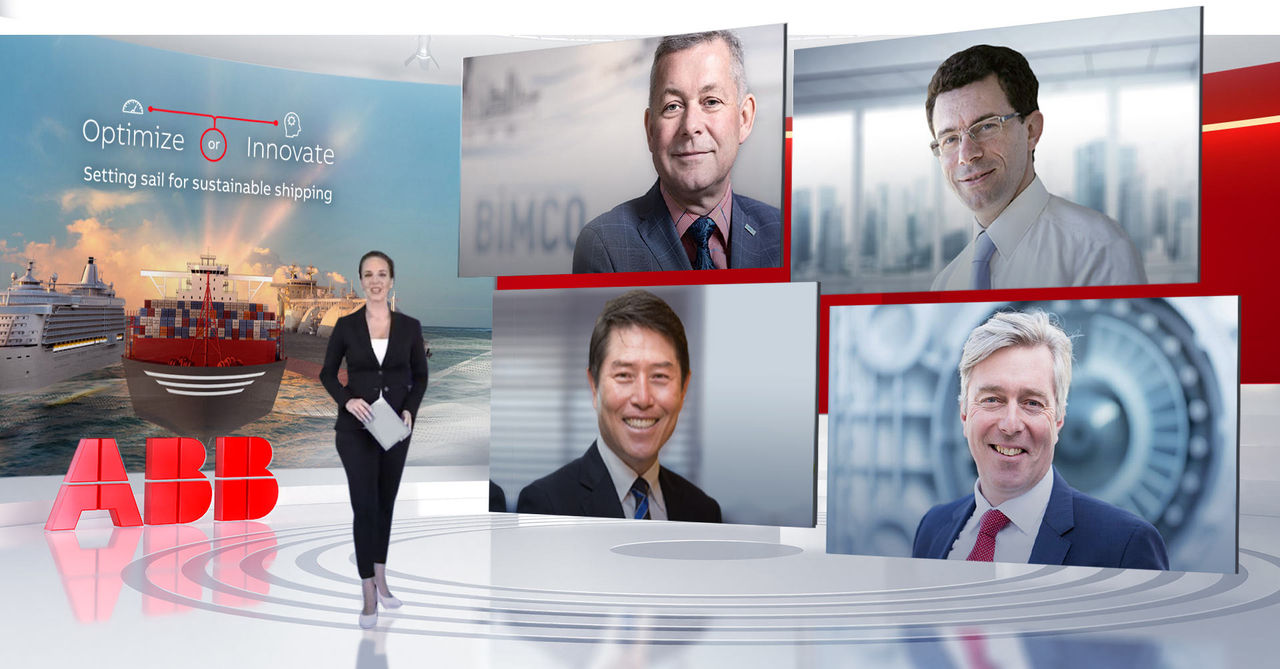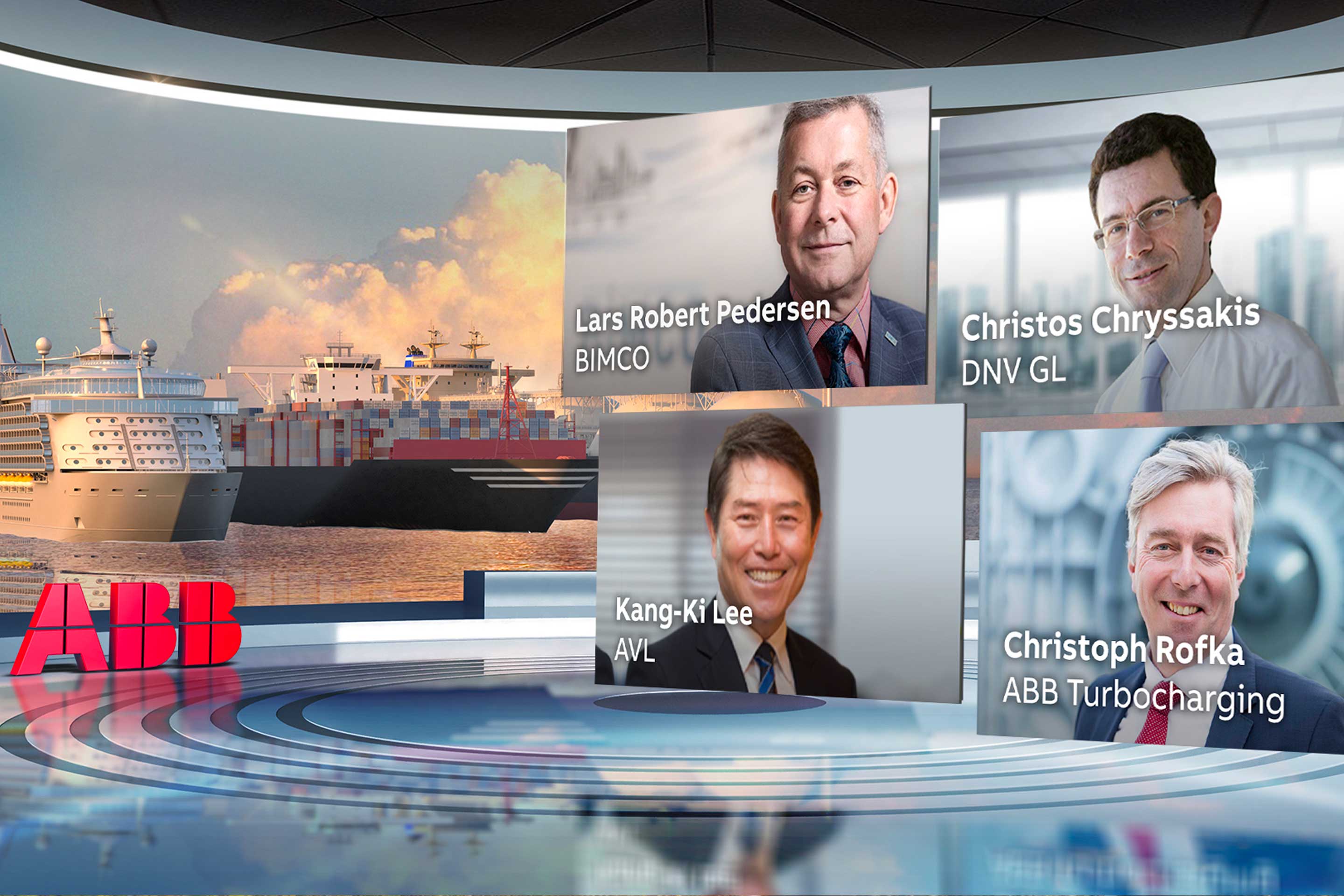On October 21, some of the maritime industry’s leading experts joined forces to present a virtual panel as part of the first ABB Industry Expert Day. The panel discussed how representatives of a leading shipowner association, engine technology institute and society view the emissions challenge facing shipping, while also tackling the biggest questions asked by the audience.
The expert panel comprised Lars Robert Pedersen, Deputy Secretary General at BIMCO, Kang-Ki Lee, Senior Vice President at AVL, Christos Chryssakis, Business Development Manager at DNV GL and ABB Turbocharging’s very own Christoph Rofka, Senior Vice President.
Can deep sea ship owners completely decarbonize by 2050?
The discussion began by addressing the need for deep sea ship owners to completely decarbonize by 2050, and whether the panels of experts felt the challenge is actually feasible.
Lars Robert Pedersen was first to respond. “I certainly think it is,” Pederson explained. “It’s something the industry needs to be able to do, although not necessarily all ships. I think we need to have ships – probably by the end of the decade – on the oceans with zero emissions.”
It‘s a point Christos Chryssakis agreed with, with the AVL Senior Vice President also questioning how the shipping industry can be supported and how low carbon fuels can be put to work. “It’s all about developing the right conditions, the right regulations to encourage and incentivize the use of such technology,” Chryssakis added.
It’s not just about regulations, either, and Kang-Ki Lee pointed out the need for public attention and the requirement to explore new technologies. Still, with enough studies and investment, Lee said he was confident it could be achieved.
“It’s decisive that we act as an industry,” Christoph Rofka added, also highlighting the need to be more vocal in a broader context, especially when it comes to ensuring future synthetic fuels are embraced in the right amounts, in the right places and at acceptable costs.
Where is shipping today, and are we moving in the right direction?
The panel then moved onto discussing where the maritime industry is today. Pedersen shared a slide from the IMO’s recent GHG Study 2020 to highlight the fact we are already actually moving in the right direction, with emissions and trade increasing in parallel throughout the 1990s and right up to a peak in 2008.
“Since then,” Pederson explained, “emissions have been on a downwards trajectory, whereas – after a small dip in 2009 – trade continued to grow.” The gap between trade and emissions continued to increase over the next decade, and although Pederson pointed out the importance of decoupling the two even further in the future, he also pointed out that we’re in a good starting place for meeting the IMO’s future legislation.
Chryssakis steered the conversation towards cleaner fuels, highlighting the fact we already have a couple of fuels that are better than conventional offerings and available today. “It’s not going to be the final solution,” added Chryssakis, “but we should take the pragmatic approach and use what is available today until we have a better solution in place.”
Chryssakis highlighted numerous alternative solutions, including biofuels, synthetic fuels and clean hydrogen and ammonia, but the challenge lies in sorting out a sustainable infrastructure.
We’ll also require technology that’s able to support alternative fuels, but according to Lee that’s not necessarily a significant issue. The internal combustion engine is likely to remain the staple power source for deep sea shipping, Lee explained, with zero carbon fuels representing the most promising energy carrier for future shipping.
“As confirmed by my colleagues in the in the panel, I think there’s a broad consensus in the industry that the piston engine will stay,” Rofka confirmed. “But it has to burn fuels, with a very low net carbon footprint.”

What’s the next step?
According to Chryssakis, how targets are met from here is the billion, or even trillion-dollar question, and it all revolves around access to clean fuels. “It could be carbon-neutral diesel, carbon-neutral natural gas, or it could be completely new fuels, for example ammonia, which will become more mature with time.”
The challenge is in making such fuels more affordable in large quantities, with the panel discussing the need for legislation to drive change, and where the funding for such change may come from. Some ship owners may even take a faster path to decarbonization, with public perceptions just one of the factors that may drive change.
What are the biggest obstacles?
“This is a process that will that will go on,” Pedersen added. “After this decade, it will continue into the next decade and beyond. So it’s a very long effort that we’re looking at. But we are quite sure that that the world will work with the shipping industry and IMO too, to create the right conditions to allow this transition to happen.”
The panel moved again to discussing costs as one of the biggest obstacles to a zero-carbon marine industry, and even subsidies won’t be enough to cover the huge costs required to make a substantial change, Lee pointed out.
Following a poll to see whether the audience thought meeting such ambitious targets is actually possible (you can check out the results in the video), the panel then moved on to answering audience questions.
With hot topics including ‘can the industry ever settle on one single clean fuel for deep sea shipping’, ‘’why should ship owners invest in LNG when it may be possible to retrofit alternative solutions with greater benefits later’ and ‘how are engine manufacturers prepared, and is the oil industry ready to decarbonize’, the panel continued to offer some fascinating insights. A further poll also suggested a positive shift in the audience’s belief that such ambitious targets can actually be met.
To catch up with the full conversation and to check out the responses to these questions, or simply to revisit the knowledge shared by the panel, check out the video of the event on ABB’s Industry Expert Day website.














